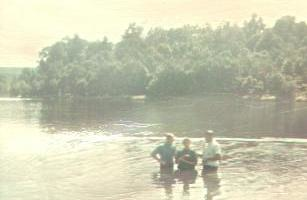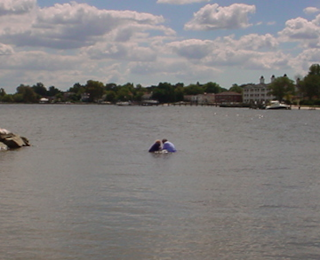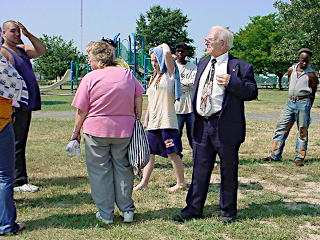
Basic Elements of Christianity
Water Baptism Rev. 00

Basic Elements of Christianity
Water Baptism Rev. 00
Then Jesus came from Galilee to John at the Jordan to be baptized by him. 14 And John tried to prevent Him, saying, "I need to be baptized by You, and are You coming to me?" 15 But Jesus answered and said to him, "Permit it to be so now, for thus it is fitting for us to fulfill all righteousness." Then he allowed Him. 16 When He had been baptized, Jesus came up immediately from the water; and behold, the heavens were opened to Him, and He saw the Spirit of God descending like a dove and alighting upon Him. 17 And suddenly a voice came from heaven, saying, "This is My beloved Son, in whom I am well pleased." (Mt. 3:13-17 NKJV)
From Mt. 28:18-20 we see that disciples of Christ are to baptize those who truly surrender their lives to God through Christ. That also means those who come to Christ ought to desire to be baptized in water. Consider well the attitude of the Ethiopian eunuch when Philip explained a portion of Isaiah 53 to him. We read the following in Acts 8:36-38: And as they went on their way, they came to a certain water: and the eunuch said, "See, here is water; what does hinder me to be baptized?" 37 And Philip said, "If you believe with all your heart, you may." And he answered and said, "I believe that Jesus Christ is the Son of God." 38 And he commanded the chariot to stand still: and they went down both into the water, both Philip and the eunuch; and he baptized him.

Water baptism is the public confession that what one has forsaken self and sin and has determined to let Christ live through them. It reinforces within the disciple the spiritual reality of being baptized into the death of Christ and being raised into newness of life. Prayerfully consider Ro. 6:1-7:
When a true disciple of Christ is baptized in water they publicly state that prior to being baptized they had surrendered their life to God through Christ and that they have entered into the spiritual reality of dying with Christ, having their sin nature buried with Him, of being risen in Him, and out of love for Him they desire to walk by His grace in the newness of His life.
 Keaton Macinta makes a statement just before being baptized in water.
Keaton Macinta makes a statement just before being baptized in water.Those who hold to baptismal regeneration will also point to the Apostle Paul's statement in Acts 22 of what Ananias said to him after praying for him to receive his sight (Ac 22:16): "And now why tarry you? arise, and be baptized, and wash away your sins, calling on the name of the Lord." However, as you learned in the lessons for Understanding The Holy Bible, context plays an extremely important role in understanding Holy Scripture. As we read the entire account we see that the Apostle Paul was regenerated by the Spirit before his water baptism because Paul states he confessed Jesus Christ as Lord before he ever got to Damascus (see Ac 9:6 and 22:10).
Albert Barnes1 explains why Ananias would use the phraseology, “wash away thy sins”: "Receive baptism, as an act expressive of the washing away of sins. It cannot be intended that the external rite of baptism was sufficient to make the soul pure, but that it was an ordinance divinely appointed as expressive of the washing away of sins, or of purifying the heart."
Also, consider what Paul wrote by the Holy Spirit in 1Co 1:14, "I thank God that I baptized none of you, but Crispus and Gaius." Paul would not thank God in this matter if water baptism was absolutely essential for salvation. No true Christian rejoices over anyone remaining damned.
One more point: If a person could not be saved from eternal damnation unless they were baptized in water then many who are in prison for life in countries that do not tolerate any aspects of Christianity and certain prisoners surrender their lives to Christ those prisoners are still doomed to damnation because they cannot be baptized in water! The same holds true in other situations. The truth is we are saved from damnation the moment we sincerely surrender our lives to God through Christ. If we are truly saved we will desire to obey Christ which includes being baptized in water. If we physically die while in Christ but have not been water baptized we still inherit Eternal Life.
 Liam Macinta about to be baptized
Liam Macinta about to be baptizedAs we continue to read we get a clue as to what Christ meant by "water" in verse 5 because when Nicodemus remained baffled Jesus said in verse 10, "Are you a master of Israel, and know not these things?" Nicodemus, a master of Israel, should have been thinking about the water and spirit in Ezekiel 36:25-27, "Then will I sprinkle clean water on you, and you shall be clean: from all your filthiness, and from all your idols, will I cleanse you. 26 A new heart also will I give you, and a new spirit will I put within you: and I will take away the stony heart out of your flesh, and I will give you an heart of flesh. 27 And I will put my spirit within you, and cause you to walk in my statutes, and you shall keep my judgments, and do them." That water in Ezekiel 36:32 refers to the Word Of God as we read in Ephesians 5:26.
You will find that there are a number of denominations and fellowships that baptize infants. In most cases, not all, infant baptism is most often a sign that those who practice it either believe we are saved by works, or if the parent/s are saved then the baby is saved, or believe everyone is already saved. All of those views are completely contrary to Holy Scripture and most likely indicate that these groups belong to the nominal church as described in our lesson on The Church. On the other hand, there are some groups in the Body Of Christ that practice infant baptism but clearly state this does not save the child and the child would still need to repent and come to Christ. One such group practices infant baptism (by pouring water on the head) as a New Testament parallel to the command to the people of Israel to circumcise their male children. However, this is still completely contrary of how water baptism was done by the early and shatters the instructive imagery of passages like Ro. 6:1-7 which is as follows:
Many, like myself, were baptized as an infant in a nominal church or fellowship. However, once they surrendered their life to God through Christ they realized their infant baptism was useless and, having been truly born again, sought to be water baptized by immersion.
Instead of baptizing infants, many churches and fellowships have a baby dedication service where the child is anointed with oil, and prayer is offered for the child and family.
 Another disciple and I baptized a new disciple at Gerry Boyle Park at Great Marsh in Cambridge, MD.
Another disciple and I baptized a new disciple at Gerry Boyle Park at Great Marsh in Cambridge, MD.As we read the Holy Scriptures we see that water baptism was done by immersing the convert in water. After all, water baptism is an outward indicator from us that we have been buried with Christ. Additionally, the Greek word used can mean the processes of immersion, submersion, emergence2. It is also interesting to see that when we read about the baptism of Jesus in Mk. 1:10 we will notice the words “coming up” (coming up out of the water). James Strong3 indicates it could mean, among other things, “spring up.” For many people, if they fill their lungs by inhaling, hold their breath, and then submerge themselves they will soon float upward.
As shown in the various images in this lesson, many times when a convert is baptized there are two disciples to perform the baptism. However, it is perfectly acceptable that one disciple does it as was the case of the Ethiopian eunuch. One does not have to be a pastor to baptize others. Any disciple may baptize a new convert. Part of the congregation observing the water baptism at Gerry Boyle Park at Great Marsh
Part of the congregation observing the water baptism at Gerry Boyle Park at Great MarshAs the true Church geographically grew, the Body Of Christ came across situations where there was not enough water available to submerge a new convert. History records that in such cases the early true Christians felt led of God to pour water on the new convert. The following is from The Teaching Of The Twelve, also known as The Didache4, a Christian document whose internal evidence suggests it was written in the latter half of the first century or the beginning of the second century: “… baptize in the name of the Father and of the Son and of the Holy Spirit in living [running, like a stream] water. But if thou hast not living water then baptize in other water; and if thou art not able in cold, then in warm. But if thou hast neither, then pour water on the head thrice in the name of the Father and of the Son and of the Holy Spirit… ."
So, in cases where a new convert cannot be immersed it is acceptable to pour water on their head or even sprinkle them with water.
 At a church campus in Delaware, a congregation observes disciples, who were given orange tee shirts, line up to be baptized in water.
At a church campus in Delaware, a congregation observes disciples, who were given orange tee shirts, line up to be baptized in water.When we run a check in Acts on the word "baptize" and the various forms of that word there are many more occurrences where the term is used without an immediate connection to the Name of Jesus Christ (or similar wording) than when there is an immediate connection.
Also, what we are seeing in the book of Acts is that the apostles and disciples were making a distinction between the water baptism of John the Baptist and the water baptism instituted by Christ. And, as you learned in Part 2 of Understanding the Holy Bible, we are to distinguish between what is actually commanded in the Word Of God from what it simply records. Malachi Macinta about to be baptized during an outdoor baptismal service in Delaware.
Malachi Macinta about to be baptized during an outdoor baptismal service in Delaware.There is no command for us to baptize new converts only in the Name of Jesus Christ, but we do have the command from Christ Himself as recorded in Mt. 28:18 to baptize new disciples in the name of the Father, and of the Son, and of the Holy Ghost (Holy Spirit).
They come to that conclusion partly because they ignore the context of that verse where Paul in 1 Corinthians 15 by the Holy Spirit was defending the fact of a future resurrection by pointing to the belief of a resurrection generally held by most people who are not Christian. Another thing you can probably spot is that Paul by the Holy Spirit did not write "what shall we do which are baptized for the dead" but "what shall they do which are baptized for the dead."
Water baptism cannot gain Eternal Life for a living person, and it certainly does nothing for someone who has physically died.
Now it is time to take the plunge and dive into a quiz (in English only).
Notes:1 From an electronic version of Barnes' Notes incorporated in the Online Bible program which is, as of 2023, available for North America at https://onlinebible.net, for the United Kingdom at onlinebible.co.uk, and for Europe at onlinebible.org .
2 Vine, W. E.: An Expository Dictionary Of New Testament Words (publisher: The Old-Time Gospel Hour Lynchburg, Va), pages 88-89
3 From an electronic version of Strong's Concordance incorporated in the Online Bible program which is, as of 2023, available for North America at https://onlinebible.net, for the United Kingdom at onlinebible.co.uk, and for Europe at onlinebible.org .
4 Page 126 of The Apostolic Fathers: an anthology of early Christian documents compiled by J. B. Lightfoot, published by Baker Book House, Grand Rapids, Michigan.
Lesson Menu
View the Glossary
Go to the Index
Abbreviations and about Reference Notations